The Poison Belt (11)
By:
June 26, 2012
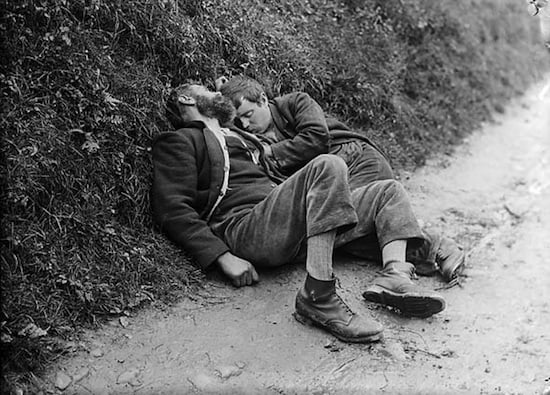
HILOBROW is pleased to present the eleventh installment of our serialization of Arthur Conan Doyle’s The Poison Belt. New installments will appear each Tuesday for 12 weeks.
If you alone had discovered that the Earth was about to be engulfed in a belt of poisonous “ether” from outer space, what would you do? Professor Challenger, a controversial scientist whose intellectual sprezzatura may remind you of Arthur Conan Doyle’s more famous fictional detective character, assembles the adventurers with whom he’d once romped through a South American jungle (in The Lost World, published in 1912) and locks them in his wife’s dressing room. Less a thriller than a brainteaser set against a catastrophic backdrop, in this 1913 sequel Challenger & Co. inquire into the method of the mind, and the relationship of intuition to reason, even as the world ends.
“To anyone who has had the delightful experience of traveling in The Lost World with Professor Challenger the bare announcement that that brilliant and eccentric personage plays a most important part in this new tale will quite suffice. For who, having once met the Professor, would not desire to continue the acquaintance?” — New York Times (1913).
“It’s impossible to read The Poison Belt, written in 1913, and not see in its exterminating vision a shadow of the coming war that would, only slightly less effectively, destroy Conan Doyle’s world.” — Gordon Dahlquist (2012 blurb for HiLoBooks)
In July, HiLoBooks will publish a beautiful new edition of The Poison Belt, with an introduction by Radium Age science fiction scholar (and HiLobrow editor) Joshua Glenn. Afterword by Gordon Dahlquist, author of The Glass Books of the Dream Eaters, The Dark Volume, and the forthcoming The Chemickal Marriage.
ALL EXCERPTS: 1 | 2 | 3 | 4 | 5 | 6 | 7 | 8 | 9 | 10 | 11 | 12
LAST WEEK: “The very vastness of the horror took away from its personal appeal. Individuals merged into groups, groups into crowds, crowds into a universal phenomenon which one soon accepted as the inevitable detail of every scene. Only here and there, where some particularly brutal or grotesque incident caught the attention, did the mind come back with a sudden shock to the personal and human meaning of it all.”
As we approached the Thames the block in the streets became thicker and the obstacles more bewildering. It was with difficulty that we made our way across London Bridge. The approaches to it upon the Middlesex side were choked from end to end with frozen traffic which made all further advance in that direction impossible. A ship was blazing brightly alongside one of the wharves near the bridge, and the air was full of drifting smuts and of a heavy acrid smell of burning. There was a cloud of dense smoke somewhere near the Houses of Parliament, but it was impossible from where we were to see what was on fire.
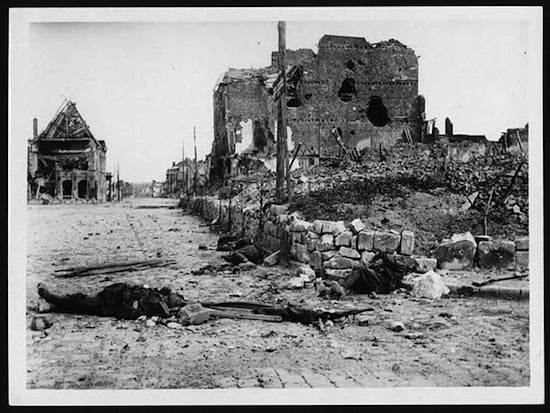
“I don’t know how it strikes you,” Lord John remarked as he brought his engine to a standstill, “but it seems to me the country is more cheerful than the town. Dead London is gettin’ on my nerves. I’m for a cast round and then gettin’ back to Rotherfield.”
“I confess that I do not see what we can hope for here,” said Professor Summerlee.
“At the same time,” said Challenger, his great voice booming strangely amid the silence, “it is difficult for us to conceive that out of seven millions of people there is only this one old woman who by some peculiarity of constitution or some accident of occupation has managed to survive this catastrophe.”
“If there should be others, how can we hope to find them, George?” asked the lady. “And yet I agree with you that we cannot go back until we have tried.”
Getting out of the car and leaving it by the curb, we walked with some difficulty along the crowded pavement of King William Street and entered the open door of a large insurance office. It was a corner house, and we chose it as commanding a view in every direction. Ascending the stair, we passed through what I suppose to have been the board-room, for eight elderly men were seated round a long table in the centre of it. The high window was open and we all stepped out upon the balcony. From it we could see the crowded city streets radiating in every direction, while below us the road was black from side to side with the tops of the motionless taxis. All, or nearly all, had their heads pointed outwards, showing how the terrified men of the city had at the last moment made a vain endeavor to rejoin their families in the suburbs or the country. Here and there amid the humbler cabs towered the great brass-spangled motor-car of some wealthy magnate, wedged hopelessly among the dammed stream of arrested traffic. Just beneath us there was such a one of great size and luxurious appearance, with its owner, a fat old man, leaning out, half his gross body through the window, and his podgy hand, gleaming with diamonds, outstretched as he urged his chauffeur to make a last effort to break through the press.
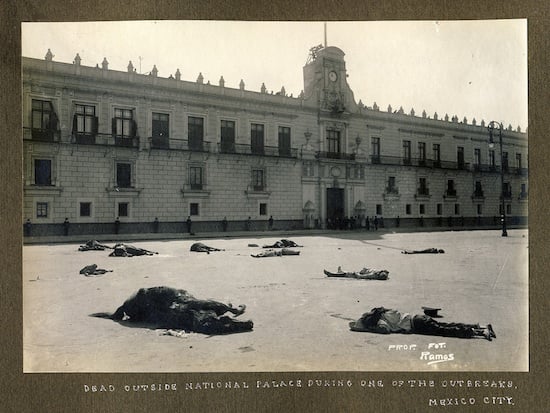
A dozen motor-buses towered up like islands in this flood, the passengers who crowded the roofs lying all huddled together and across each others’ laps like a child’s toys in a nursery. On a broad lamp pedestal in the centre of the roadway, a burly policeman was standing, leaning his back against the post in so natural an attitude that it was hard to realize that he was not alive, while at his feet there lay a ragged newsboy with his bundle of papers on the ground beside him. A paper-cart had got blocked in the crowd, and we could read in large letters, black upon yellow, “Scene at Lord’s. County Match Interrupted.” This must have been the earliest edition, for there were other placards bearing the legend, “Is It the End? Great Scientist’s Warning.” And another, “Is Challenger Justified? Ominous Rumours.”
Challenger pointed the latter placard out to his wife, as it thrust itself like a banner above the throng. I could see him throw out his chest and stroke his beard as he looked at it. It pleased and flattered that complex mind to think that London had died with his name and his words still present in their thoughts. His feelings were so evident that they aroused the sardonic comment of his colleague.
“In the limelight to the last, Challenger,” he remarked.
“So it would appear,” he answered complacently. “Well,” he added as he looked down the long vista of the radiating streets, all silent and all choked up with death, “I really see no purpose to be served by our staying any longer in London. I suggest that we return at once to Rotherfield and then take counsel as to how we shall most profitably employ the years which lie before us.”
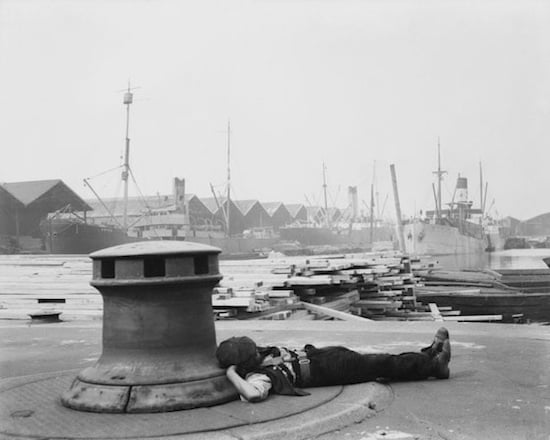
Only one other picture shall I give of the scenes which we carried back in our memories from the dead city. It is a glimpse which we had of the interior of the old church of St. Mary’s, which is at the very point where our car was awaiting us. Picking our way among the prostrate figures upon the steps, we pushed open the swing door and entered. It was a wonderful sight. The church was crammed from end to end with kneeling figures in every posture of supplication and abasement. At the last dreadful moment, brought suddenly face to face with the realities of life, those terrific realities which hang over us even while we follow the shadows, the terrified people had rushed into those old city churches which for generations had hardly ever held a congregation. There they huddled as close as they could kneel, many of them in their agitation still wearing their hats, while above them in the pulpit a young man in lay dress had apparently been addressing them when he and they had been overwhelmed by the same fate. He lay now, like Punch in his booth, with his head and two limp arms hanging over the ledge of the pulpit. It was a nightmare, the grey, dusty church, the rows of agonized figures, the dimness and silence of it all. We moved about with hushed whispers, walking upon our tip-toes.
And then suddenly I had an idea. At one corner of the church, near the door, stood the ancient font, and behind it a deep recess in which there hung the ropes for the bell-ringers. Why should we not send a message out over London which would attract to us anyone who might still be alive? I ran across, and pulling at the list-covered rope, I was surprised to find how difficult it was to swing the bell. Lord John had followed me.
“By George, young fellah!” said he, pulling off his coat. “You’ve hit on a dooced good notion. Give me a grip and we’ll soon have a move on it.”
But, even then, so heavy was the bell that it was not until Challenger and Summerlee had added their weight to ours that we heard the roaring and clanging above our heads which told us that the great clapper was ringing out its music. Far over dead London resounded our message of comradeship and hope to any fellow-man surviving. It cheered our own hearts, that strong, metallic call, and we turned the more earnestly to our work, dragged two feet off the earth with each upward jerk of the rope, but all straining together on the downward heave, Challenger the lowest of all, bending all his great strength to the task and flopping up and down like a monstrous bull-frog, croaking with every pull. It was at that moment that an artist might have taken a picture of the four adventurers, the comrades of many strange perils in the past, whom fate had now chosen for so supreme an experience. For half an hour we worked, the sweat dropping from our faces, our arms and backs aching with the exertion. Then we went out into the portico of the church and looked eagerly up and down the silent, crowded streets. Not a sound, not a motion, in answer to our summons.
“It’s no use. No one is left,” I cried.
“We can do nothing more,” said Mrs. Challenger. “For God’s sake, George, let us get back to Rotherfield. Another hour of this dreadful, silent city would drive me mad.”
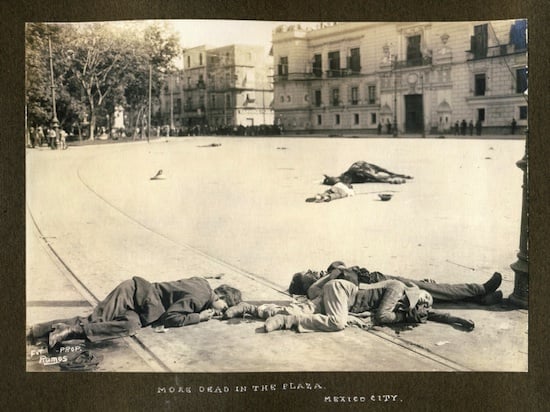
We got into the car without another word. Lord John backed her round and turned her to the south. To us the chapter seemed closed. Little did we foresee the strange new chapter which was to open.
THE GREAT AWAKENING
And now I come to the end of this extraordinary incident, so overshadowing in its importance, not only in our own small, individual lives, but in the general history of the human race. As I said when I began my narrative, when that history comes to be written, this occurrence will surely stand out among all other events like a mountain towering among its foothills. Our generation has been reserved for a very special fate since it has been chosen to experience so wonderful a thing. How long its effect may last — how long mankind may preserve the humility and reverence which this great shock has taught it — can only be shown by the future. I think it is safe to say that things can never be quite the same again. Never can one realize how powerless and ignorant one is, and how one is upheld by an unseen hand, until for an instant that hand has seemed to close and to crush. Death has been imminent upon us. We know that at any moment it may be again. That grim presence shadows our lives, but who can deny that in that shadow the sense of duty, the feeling of sobriety and responsibility, the appreciation of the gravity and of the objects of life, the earnest desire to develop and improve, have grown and become real with us to a degree that has leavened our whole society from end to end? It is something beyond sects and beyond dogmas. It is rather an alteration of perspective, a shifting of our sense of proportion, a vivid realization that we are insignificant and evanescent creatures, existing on sufferance and at the mercy of the first chill wind from the unknown. But if the world has grown graver with this knowledge it is not, I think, a sadder place in consequence. Surely we are agreed that the more sober and restrained pleasures of the present are deeper as well as wiser than the noisy, foolish hustle which passed so often for enjoyment in the days of old — days so recent and yet already so inconceivable. Those empty lives which were wasted in aimless visiting and being visited, in the worry of great and unnecessary households, in the arranging and eating of elaborate and tedious meals, have now found rest and health in the reading, the music, the gentle family communion which comes from a simpler and saner division of their time. With greater health and greater pleasure they are richer than before, even after they have paid those increased contributions to the common fund which have so raised the standard of life in these islands.
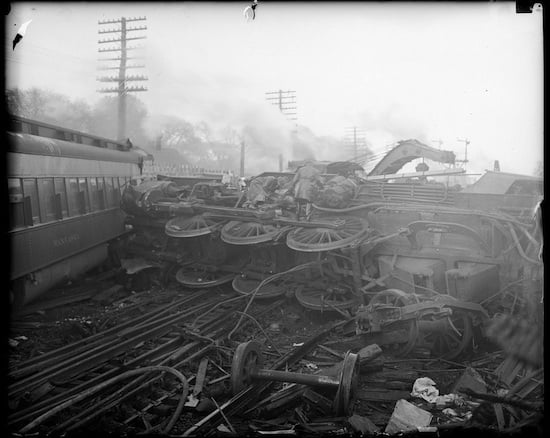
There is some clash of opinion as to the exact hour of the great awakening. It is generally agreed that, apart from the difference of clocks, there may have been local causes which influenced the action of the poison. Certainly, in each separate district the resurrection was practically simultaneous. There are numerous witnesses that Big Ben pointed to ten minutes past six at the moment. The Astronomer Royal has fixed the Greenwich time at twelve past six. On the other hand, Laird Johnson, a very capable East Anglia observer, has recorded six-twenty as the hour. In the Hebrides it was as late as seven. In our own case there can be no doubt whatever, for I was seated in Challenger’s study with his carefully tested chronometer in front of me at the moment. The hour was a quarter-past six.
An enormous depression was weighing upon my spirits. The cumulative effect of all the dreadful sights which we had seen upon our journey was heavy upon my soul. With my abounding animal health and great physical energy any kind of mental clouding was a rare event. I had the Irish faculty of seeing some gleam of humor in every darkness. But now the obscurity was appalling and unrelieved. The others were downstairs making their plans for the future. I sat by the open window, my chin resting upon my hand and my mind absorbed in the misery of our situation. Could we continue to live? That was the question which I had begun to ask myself. Was it possible to exist upon a dead world? Just as in physics the greater body draws to itself the lesser, would we not feel an overpowering attraction from that vast body of humanity which had passed into the unknown? How would the end come? Would it be from a return of the poison? Or would the earth be uninhabitable from the mephitic products of universal decay? Or, finally, might our awful situation prey upon and unbalance our minds? A group of insane folk upon a dead world! My mind was brooding upon this last dreadful idea when some slight noise caused me to look down upon the road beneath me. The old cab horse was coming up the hill!
I was conscious at the same instant of the twittering of birds, of someone coughing in the yard below, and of a background of movement in the landscape. And yet I remember that it was that absurd, emaciated, superannuated cab-horse which held my gaze. Slowly and wheezily it was climbing the slope. Then my eye traveled to the driver sitting hunched up upon the box and finally to the young man who was leaning out of the window in some excitement and shouting a direction. They were all indubitably, aggressively alive!
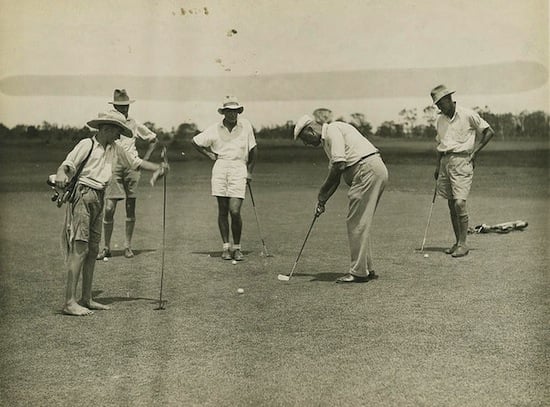
Everybody was alive once more! Had it all been a delusion? Was it conceivable that this whole poison belt incident had been an elaborate dream? For an instant my startled brain was really ready to believe it. Then I looked down, and there was the rising blister on my hand where it was frayed by the rope of the city bell. It had really been so, then. And yet here was the world resuscitated — here was life come back in an instant full tide to the planet. Now, as my eyes wandered all over the great landscape, I saw it in every direction — and moving, to my amazement, in the very same groove in which it had halted. There were the golfers. Was it possible that they were going on with their game? Yes, there was a fellow driving off from a tee, and that other group upon the green were surely putting for the hole. The reapers were slowly trooping back to their work. The nurse-girl slapped one of her charges and then began to push the perambulator up the hill. Everyone had unconcernedly taken up the thread at the very point where they had dropped it.
NEXT WEEK: “‘Was you outside the Bank of England, sir?’ ‘Yes, Austin.’ ‘With all them millions inside and everybody asleep?’ ‘That was so.’ ‘And I not there!’ he groaned, and turned dismally once more to the hosing of his car.”
RADIUM AGE SCIENCE FICTION: “Radium Age” is HILOBROW’s name for the 1904–33 era, which saw the discovery of radioactivity, the revelation that matter itself is constantly in movement — a fitting metaphor for the first decades of the 20th century, during which old scientific, religious, political, and social certainties were shattered. This era also saw the publication of genre-shattering writing by Edgar Rice Burroughs, Sax Rohmer, E.E. “Doc” Smith, Jack London, Arthur Conan Doyle, Aldous Huxley, Olaf Stapledon, Karel Čapek, H.P. Lovecraft, Charlotte Perkins Gilman, Yevgeny Zamyatin, Philip Gordon Wylie, and other pioneers of post-Verne/Wells, pre-Golden Age “science fiction.” More info here.
HILOBOOKS: The mission of HiLoBooks is to serialize novels on HiLobrow; and also, as of 2012, operating as an imprint of Richard Nash’s Cursor, to reissue Radium Age science fiction in beautiful new print editions. So far, we have published Jack London’s The Scarlet Plague, Rudyard Kipling’s With the Night Mail (and “As Easy as A.B.C.”), Arthur Conan Doyle’s The Poison Belt, H. Rider Haggard’s When the World Shook, Edward Shanks’s The People of the Ruins, William Hope Hodgson’s The Night Land, and J.D. Beresford’s Goslings. Forthcoming: E.V. Odle’s The Clockwork Man, Cicely Hamilton’s Theodore Savage, and Muriel Jaeger’s The Man with Six Senses. For more information, visit the HiLoBooks homepage.
READ: Jack London’s The Scarlet Plague, serialized between January and April 2012; and Rudyard Kipling’s With the Night Mail (and “As Easy as A.B.C.”), serialized between March and June 2012.
ORIGINAL FICTION: HILOBROW has serialized three novels: James Parker’s The Ballad of Cocky The Fox (“a proof-of-concept that serialization can work on the Internet” — The Atlantic) and Karinne Keithley Syers’s Linda Linda Linda. We also publish original stories and comics.
